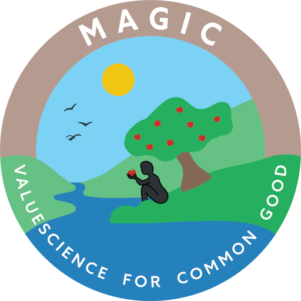Beginnings
In the early 1970’s, a half dozen friends came together with the purpose of learning to live better and contribute to others’ doing so. Challenged by a postal service employee to pick on the spot a name for our group on the spot so that we might share a post office box as unrelated individuals, we light-heartedly called ourselves Magic.
Few people at that time had heard of ecology—scientific study of interaction between life and environment. Fewer still had given much thought to it. Early Magicians and those who’ve followed share a perception that ecology is the sole demonstrated method to more accurately discern and more fully enjoy value.
This insight is the foundation for valuescience, an emergent discipline to which Magicians have been key contributors, and a core practice underpinning Magic’s work. We perceive valuescience to be a uniquely effective means to further human well-being by addressing a full spectrum of concerns at their roots and in a sound and integrated fashion.
From the outset, some Magicians lived and worked together as an intentional community so that we might broadly benefit from each other’s partnership in learning and applying valuescience. When we incorporated Magic as a public service organization in 1979, this core group assumed primary responsibility for shaping and delivering its programs. Ever since, residents of the intentional community have relied upon valuescience to generate insights and to apply these to further common good.
In the following sections we present an overview of the Magic intentional community: its foundational ideas, its past, its present, and plans for its future.
Ideas
Many humans lack the requisites of a decent life. Despite millennia of technological innovation, social reform, and philanthropic effort, more people today than ever before are starving, homeless, sick, brutalized, environmentally poisoned, and struggling to find meaning and purpose.
We at Magic view these afflictions to be symptoms. We work to end them by addressing underlying causes. As humans become more numerous and powerful, we see mounting evidence that we can trace these causes through our own behaviors to our information about value—about what we want and how to get it—on which we base behavior, and finally to flawed methods by which we obtain and qualify that information.
Information about value is encoded in our genes at conception, and in our brains and other structures through experience. Some is inaccurate, as we discover when we get what we think we want and feel disappointed or do what we think sufficient and come up short. To live and die well and contribute to others’ doing so, we learn to more accurately discern and more fully realize value.
Information pertaining to value entails prediction of consequences of interactions with an environment that includes other people, other life, and abiotic entities, both natural and artificial. Ecology is the sole demonstrated means for predicting such outcomes more successfully than we can predict them by chance. It is the only way humans have discovered to inform action so that we more often get what we want and want what we get. Ecology practiced to these ends is valuescience.
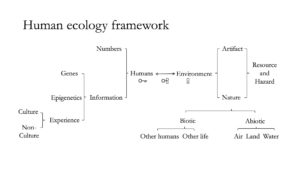
As we become more adept and consistent in valuesciencing, we change broadly and deeply, altering how we work, play, relate to others, and think about ourselves. We science to qualify other ways of knowing value, including adherence to “gut” instincts, to religious, political, or other authority, or to popular opinion.
Magic’s residential service learning community is a context for people who want to root out misinformation about value—however deeply embedded—and reconstruct self and society on firmer ground. We found the community on proven learning methods: (1) immersion is among the most effective ways to learn, especially when learning entails broad and deep personal transformation; (2) partners in change can facilitate and accelerate individuals’ becoming more as we intend; (3) example is a powerful lesson; and (4) we learn more by doing than by merely hearing or seeing.
The Magic service learning community is both laboratory and demonstration. Participants valuescience to generate meaning and purpose; to become healthier and contribute to others’ doing so; to shape a freer, fairer, more peaceful society; and to protect and enhance the natural and constructed environments. We demonstrate how individuals can create an integrated living-working environment in which abstract ideas about furthering human well-being are bases for concrete actions that yield observable and measurable benefits. Magicians emphasize that particulars of our practices illustrate a few of many possible ways, rather than “the” way to valuescience for individual and common good.
Past
At the outset, Magicians were more or less peers. After renting together for a few years, we purchased a house in 1976. Over time we became a node in a network of progressives. We worked towards greater personal awareness and health; more widespread peace, freedom, and justice; and more effective environmental protection, and we hosted and collaborated with others working to these ends.
As those of us who persisted in making Magic gained experience and proficiency in articulating and valuesciencing, we became known for this and attracted people who wanted to live, learn, and serve with us so that they might hone their own understandings and practices. By 1979, when we registered Magic as a public service organization to research and teach human ecology, we were guiding a steady stream of resident interns, associates, and affiliates in applying valuescience to realize their individual potentials and contribute to others’ realizing theirs.
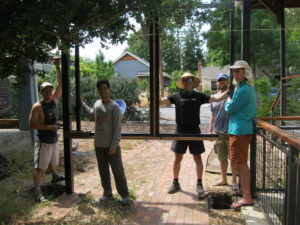
During Magic’s first forty years, more than one hundred residents participated in the service learning community for a year or more, another two hundred participated for a month to a year, hundreds more participated for days or weeks, thousands of non-residents made day visits, and tens of thousands of people directly, and many more indirectly benefitted from public services delivered by residents.
Editors and publishers of books, magazines, and newspapers have found the Magic service learning community worthy of note. Magic was selected to be the subject of a lengthy profile in the Communities Directory, a comprehensive guide to more than six hundred intentional communities throughout the U.S. It also has been featured in articles in Communities, the Journal of Cooperative Living, in a five-page cover story and photo essay in the Palo Alto Weekly, in a two-page alumni profile in Stanford magazine, and in a San Jose Metro cover story. Print, broadcast, and web media have published numerous reports acknowledging Magicians’ contributions to common good.
In October, 2019 we celebrated the 40th anniversary of Magic’s incorporation and completion of a thorough, decade-long organizational renewal. During this ten-year period we’ve been reconstructing valuescience curriculum, revising other program content, broadening the community of Magic supporters, and overhauling and expanding organizational and physical infrastructure to increase our capacity to serve. Residential service-learning community personnel have led this process.
Present
The Magic community is recognized as a unique and successful experiment. We enjoy ongoing working relationships to provide service learning opportunities for students at Stanford, at other colleges and universities, and at public and private elementary, middle, and high schools. We also partner with employees of local businesses and members of community organizations and religious congregations.
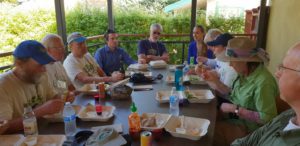
We host, and exchange ideas with other leaders in the intentional communities movement, in public service, in land planning and building construction, in ecosystem conservation, and in education. In a typical year we receive inquiries from more than a hundred prospective residents living around the nation and the world, about twenty of whom we accept for stays of a few weeks to a year or more. We also host hundreds of visitors and program participants annually.
Since the organization’s founding, Magicians have published in peer-reviewed professional journals. By doing so we’ve earned credibility in scientific circles. We’re utilizing opportunity created by this reputation to bring valuescience to the fore in teaching and in demonstration projects at Stanford and in other mid-San Francisco Peninsula/Silicon Valley contexts. Since 2010 we’ve made valuescience learning available on-line and without fee by posting a syllabus, lectures, study questions, and other materials.
The service learning community is key to communicating valuescience. With it Magicians provide an integrated example of how people can shape satisfying work and home lives by weaving together ideas and practices studied, taught, and applied through other Magic programs. We take satisfaction in the many compliments we receive from thoughtful observers who laud us for “walking our talk.”
The information communicated within and through the service learning community is a broad, deep blend of theory and practice. Participants learn methods and principles of valuescience and apply them to reassess fundamental ideas about identity and purpose, to become healthier, to improve relationships with others, and to become better stewards of the environment. As they do these things, they also operate Magic and play key roles in delivering its programs for benefit of the general public.
Magic’s physical facilities are well-matched to needs of the service learning community. Three single family residences on adjacent lots in a quiet Palo Alto neighborhood abutting Stanford University are within walking distance of shopping and major transit lines and within bicycling distance of thousands of acres of publicly accessible open space. Nearby churches, schools, and commercial facilities are available to accommodate Magic activities that might be out-of-place in our peaceful residential neighborhood.
The properties together comprise one-half acre. We’re evolving a permaculture landscape emphasizing native plants and fruit trees and demonstrating techniques for percolating storm water, reusing household gray water, and eschewing toxic and fossil-fuel-based operations and maintenance.
Buildings comprise approximately 8,000 square feet. We renovated one residence in 2000. In 2015, we occupied another, newly-constructed and designed and built to evidence ecological sensibility. On-site facilities include an office, a workshop, gym, and music practice and recreation rooms.
Four resident fellows with tenures of ten to more than forty years guide the community. Ten to fifteen other residents learn and serve with benefit of their experience. Together these Magicians welcome a steady stream of short-term resident interns and day visitors diverse in age and experience. Despite rigorous selection standards, qualified applicants to the residential service learning community substantially exceed the number we are able to accommodate.
Future
Recent and ongoing physical facilities expansion and renovation, growth in personnel, and publishing and teaching successes represent a rich opportunity. Magic now has wherewithal to further public interest more effectively than ever before. To this end we are conducting a growing number of valuescience meetings, seminars, and public presentations aimed at expanding the ranks of people who understand the importance of this discipline, who apply it to benefit self and others, and who support Magic’s leadership in developing and disseminating it. We’re relishing the greater capacity of this larger service community as we complete the organizational renewal underway and expand valuescience research and teaching so that humankind can more fully reap its benefits.
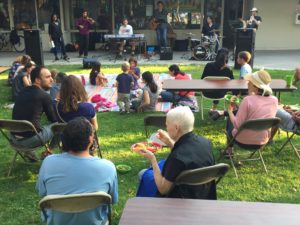
If you want to learn more about valuescience, apply it to further common good, and support others in doing these things, please consider how you might participate in the Magic intentional community: visit for a meal; if you want to test the water more boldly, come stay for a day or a few; if you’re ready to jump in, apply to be a resident. Whoever you are, you may be able to improve your own and others’ well-being by participating in the continuing evolution of the pioneering experiment that is the Magic service learning community. We’ll welcome your partnership. ❧
